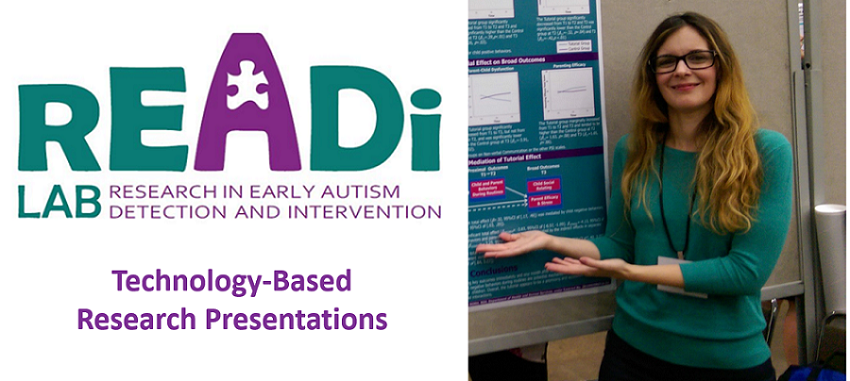Last week at IMFAR, clinical psychology graduate student Sarah Edmunds and Assistant Director Lisa Ibañez presented data on studies that applied technology to improve measurement and behaviors.
Sarah gave a poster presentation that examined whether children’s eye-to-eye gaze during social interactions can be coded reliably from video captured by a “point of view” (PoV; eyeglass-mounted camera) camera worn by the social partner, compared to videos from tripod-mounted camcorders. Coders identified looks to eyes, face, and away more reliably, and detected more looks to eyes, when viewing the PoV videos. Children with ASD looked less frequently to the eyes and face and looked away longer than TD children. The PoV camera presents an easily-deployed and cost-effective method for capturing gaze during social interactions. Click here to see Sarah’s poster!
Lisa gave a poster presentation on a randomized control trial examining the effectiveness of an interactive, web-based parenting tutorial for improving: (1) parent and child behaviors during everyday family routines (i.e., proximal outcomes); and (2) parenting efficacy and stress and child social-communication (i.e., broad outcomes). Parents of children with ASD completed questionnaires at baseline (T1), 4 weeks after T1 (T2; post-tutorial completion), and 8 weeks after T1 (T3). For proximal outcomes, the Tutorial group’s (n= 52) ratings were significantly lower for children’s negative behaviors and higher for parents’ use of verbal and non-verbal strategies at T2 and T3 than the Control group’s (n= 52). For broad outcomes, the Tutorial group was significantly lower on parent-child dysfunction at T3, and significantly higher on child social relating at T2 and T3 than the Control group. Click here to see Lisa’s poster! A demo of the parenting tutorial is available at https://uwreadilab.com/online-tutorials.

